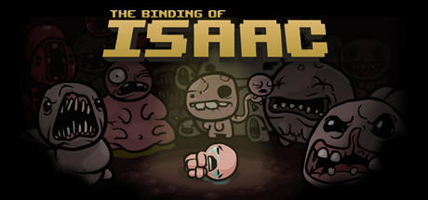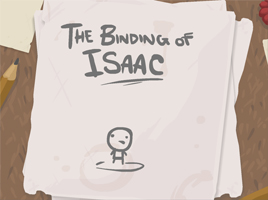

developed by Edmund McMillen (Santa Cruz, CA) and Florian Himsl (Innsbruck, Austria)
first released September 28, 2011, for Windows/Mac (November 1, 2011, for Linux), $4.99
[trailer]
[online demo]
~310 MB
Played to 63 deaths, but still haven’t reached “Mom” once, in 11 hours, 3/6/15–3/14/15.
[Video of the game intro. And then, well, here are the first 200 of one guy’s 980 video playthroughs; that oughta get you started.]
Third of the seven games in the “Humble Voxatron Debut,” purchased November 9, 2011.
My comments here tend toward the psychoanalytical… but this game cries out so noisily and self-consciously to be psychoanalyzed that I don’t wanna. But I’ll probably end up anyway.
The Binding of Isaac is a dead-baby-joke alienation test from the designer:
“You’re going to think I’m a sick freak, and abandon me, when I show you this!!! or this!!! Yeah, because this is the kind of dark stuff that only the right kind of people, wounded weirdos like me, will ever really understand. Sickens you, doesn’t it? Well that’s what life is like for me, so just think about that, as you run away in disgust.”
That’s the script. But in fact this game turned out to be incredibly popular with a wide audience. Which just goes to show: the script is the damage.
At the same time, all those people who’ve played this game for hundreds of hours despite all its blood and piss and shit and maggots and aborted fetuses are being drawn subtly into its circle of gleeful woundedness, where desensitization is a badge of honor. “Yeah yeah, it’s gross, but that’s the point. The game is actually kind of awesome.” Over the 11 hours I logged with this thing, I got there too. “Yeah yeah.”
Part of the reason the game failed to fail as it was intended to is because this stuff is done from a very genuine place of woundedness, so it doesn’t actually feel resentful or particularly confrontational. It’s just distasteful in a simple, direct way, which isn’t that challenging a thing.
Having seen Indie Game: The Movie (streaming on Netflix!) I have a very clear sense of what type Edmund McMillen is. His “freak flag” alienation impulse is genuine and open-hearted and a little mushy; all his cute and cuddly cartoons of neotenous maggots and intestinal heaps come from a part of himself that he holds sacred, and that sweet sentimentality comes through. The game is as real and undiluted as a stapled zine.
The design of the gameplay is similarly heartfelt, a lovingly simple recreation of the dungeons from The Legend of Zelda, populated with an endless catalog of giddy gross-out nightmares. It’s all integrated tightly and works the way it’s supposed to; you can feel a deep intuition for video games behind it. It’s a very fully-realized personal vision from a guy whose foundational life-image is of being a kid sitting in the basement exploring the mysteries of Nintendo worlds, feeling the terror of fathomless social alienation swirling around him in the shadows. There’s a whole generation of such people; I knew plenty of them growing up. And I can of course relate in part, though my personal brand of alienation was that I didn’t trust such people, whose fears ruled them and clouded their eyes. People who, in this very way, resembled me.
Perhaps it really all just came down to the fact that I didn’t have a Nintendo and listened to music that truly nobody else I knew listened to, so even the idea of a community united under some existing freak flag wasn’t available to me. But the defining thing about those communities seemed always, as here, to be outsiderdom itself, and I never liked the idea that my pain was what would unite me with others. Victimhood had no appeal to me as a secret handshake, and still doesn’t. Happiness should be the secret handshake!
I get that below the surface, that’s what’s being offered here too: “Regardless of what the normals say, we know that it doesn’t matter if you play a game where you shoot tears at maggots that spit blood! It doesn’t matter if the goal in the game is to kill your mom before she murders you! We’re free from taboo here! We know that it doesn’t matter, because life is actually good and the universe is actually merciful.” Right, good for you and the Marquis de Sade that you found your way there through the pile of shit you’re obsessed with. I don’t want to take that away from anyone who needs it. But I can’t help wishing I wasn’t surrounded by people who needed it.
This is by far the most “The Aristocrats”-style gross-out game I can think of, but it’s characteristic of a broad wounded-adolescent strain in “indie” game culture (and “indie” comedy too, and probably other things). “Indie” tends to mean “misunderstood”/”the little guy”/”the outsider,” with all the attendant baggage. I wish it didn’t. Independence is freedom! Independence is power!
The Binding of Isaac is definitely compelling, but only within a mindset completely devoid of freedom and power. You get hooked on it only in that zone that floats between content and form. The content is willfully distasteful, and the form is bare bones: what’s left to care about is only the unhealthy stuff, the compulsion, the addiction. My first two minutes of play were a big shrug: “This seems like a dumb little mini-game, just a gonzo riff on Zelda without anything else to offer.” The remaining eleven hours were a stepping back from the attentiveness of that shrug. One becomes numbly eager to unlock, progress, endlessly see it on through to whatever fate it decrees.
Basically, this game is a construct entirely of the stuff I have complained about in previous entries: catalogs and upgrades and leveling up and collectibles and achievements. That stuff is the heart of the game, and it has all been crafted with love by a guy who does love it.
This thinks of itself as a player-loving game, a generous game, a gamer’s game, but it’s only speaking to a certain psychology, and not the healthy one. Talk about a Skinner box! You are literally trapped like a rat in a series of boxes, doing the same things over and over and getting prizes, at unpredictable intervals. Is there a coin in this pile of poop? No. In this one? No. In this one? No. In this one? No. In this one? Yes!
The game is pure conditioning. The way it works is, each time you start it up, the ‘dungeon’ and its contents are randomly generated, and you win or lose within about half an hour (usually lose). Then the journey can only start again, completely from scratch. But the more you play and the further you manage to get, the more goodies get thrown into the pot of elements that might show up. The game itself “levels up” as your devotion deepens. But it never stops being random, unpredictable, circular, endless, truly Sisyphean.
We tend to think of the scientist having contempt for his poor rats, but what if he loves them and is trying to show them a good time? What if he’s a rat himself? When that rat in the box grows up, still carrying the conditioning with it, it will have fond memories and want to offer that precious experience to others. “Here, my child, into the box! You’re gonna love this; I know I did.”
Edmund McMillen wants us all to have the same magical experiences of discovery, frustration, exploration, and achievement that he remembers having as a kid, so he’s built this awesome box. See link above for the YouTube guy with 980 videos (1345 and counting if you include the remade version from last year). I’m not sure it’s possible to have a genuine cultural experience 980 times; anything you do that many times is more like a bodily function.
I absolutely fell for it and felt the magical tug of the slot machine that pays off just often enough — hell, this one even pays off a little more than that! (There are in fact such slot machines depicted inside the game. The first time you encounter one, it gives you a string of good luck to get you hooked. After that the odds drop off. The designer thinks this is cruel and funny, but he also thinks it’s genuine fun. What’s the difference, right?)
I am able to walk away now in great part because I’m just not very good at the core mechanic of this game: moving around in four directions while shooting in four directions. I bump into stuff all the time and don’t react accurately under pressure. I don’t have reliable instincts, even after 11 hours of play. My impression from the achievement stats on Steam is that most people who’ve played as long as I have have seen the end at least once. So, great, I think that means I can stop.
Leftover meanderings:
The empty embrace of “sick” stuff can really piss me off. People are distressingly happy to buy and sell “burning kinky resentment of conformity” as a conformist commodity. In the long run, that’s just more repression they’re buying into. Little though we want to accept it, nonconformity will never feel socially-approved. It’s the opposite by definition. The real thing will necessarily always feel lonely and dangerous and there’s no way of doing an end run around that. So embracing a readymade “freak” identity is always going to be counterproductive. All the more your resentment will burn and your kinks will kink further… and all the more you’ll think you’re exactly in the market for the next package of “think different.” It’s a vicious cycle.
Is there anybody who doesn’t absolutely revile those “Just the right amount of wrong” casino ads? What does “wrong” mean, here? A girl dancing? People kissing in the elevator? What are you talking about? The slogan should be “Exactly as inhibited as you.” Yeah, baby! There’s nothing hotter than reinforcing one’s own inhibitions. Mm, I’ve been such a naughty, naughty human being. Only virgins know how dirty sex is; only the poor know how filthy it is to be rich. Only the repressed know how titillatingly glamorous agency is. Ooh-la-la!
I have never played “Cards Against Humanity” but everything about it makes me angry. “A party game for horrible people.” “Ha ha oh man this is perfect for sick fucks like us!” Hey, “sick fuck,” the cards are pre-printed with those punchlines, and the game is incredibly popular, so how cheeky and deviant are you really? TGIF, you wild and crazy guy, you!
Plus the interchangeable “sick” punchlines are all designed to play to standard Sarah Silverman mock-inverted liberalism, which isn’t actually any sort of freethinking, but actually a force for puritanical PC. “Ha ha ha, oh man, abuse racism sexism rape privilege, good times, good times!” and then everyone laughs a nervous laugh and crosses themselves.
Basically this is an Edmund McMillen joint, programmed by Florian Himsl. (This post-mortem by McMillen is somewhat interesting.)
The credits as they appear in the game:
A game by: Edmund McMillen (Art Stuff), Florian Himsl (Programer) [sic]
Music by: Danny Baranowsky!
Sound FX by: Jordan Fehr
Voiced by: Matthias Bossi